Related Research Articles

Umberto Eco was an Italian medievalist, philosopher, semiotician, novelist, cultural critic, and political and social commentator. In English, he is best known for his popular 1980 novel The Name of the Rose, a historical mystery combining semiotics in fiction with biblical analysis, medieval studies and literary theory, as well as Foucault's Pendulum, his 1988 novel which touches on similar themes.
Clerical fascism is an ideology that combines the political and economic doctrines of fascism with clericalism. The term has been used to describe organizations and movements that combine religious elements with fascism, receive support from religious organizations which espouse sympathy for fascism, or fascist regimes in which clergy play a leading role.
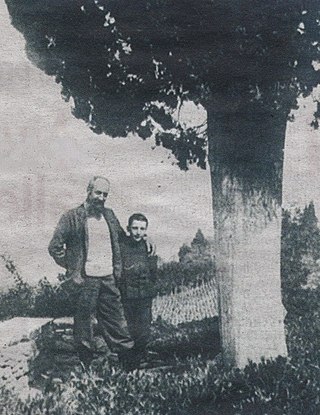
Alfredo Oriani was an Italian author, writer and social critic. He is often considered a precursor of Fascism, and in 1940 his books were placed on the Index Librorum Prohibitorum of the Catholic Church.

The Biennio Rosso was a two-year period, between 1919 and 1920, of intense social conflict in Italy, following the First World War. The revolutionary period was followed by the violent reaction of the fascist blackshirts militia and eventually by the March on Rome of Benito Mussolini in 1922.
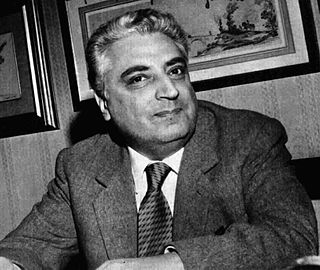
Renzo De Felice was an Italian historian, who specialized in the Fascist era, writing, among other works, a 6000-page biography of Mussolini. He argued that Mussolini was a revolutionary modernizer in domestic issues but a pragmatist in foreign policy who continued the Realpolitik policies of Italy from 1861 to 1922. Historian of Italy Philip Morgan has called De Felice's biography of Mussolini "a very controversial, influential and at the same time problematic re-reading of Mussolini and Fascism" and rejected the contention that his work rose above politics to "scientific objectivity", as claimed by the author and his defenders.
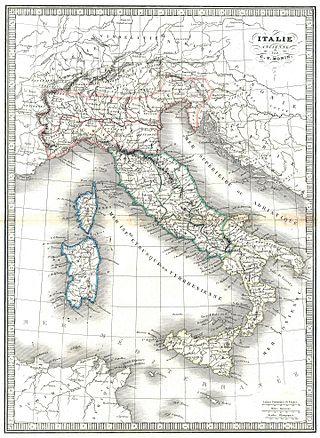
Italian fascism, also classical fascism and Fascism, is the original fascist ideology, which Giovanni Gentile and Benito Mussolini developed in Italy. The ideology of Italian Fascism is associated with a series of political parties led by Mussolini: the National Fascist Party (PNF), which governed the Kingdom of Italy from 1922 until 1943, and the Republican Fascist Party (PFR), which governed the Italian Social Republic from 1943 to 1945. Italian fascism also is associated with the post–war Italian Social Movement (MSI) and later Italian neo-fascist political organisations.
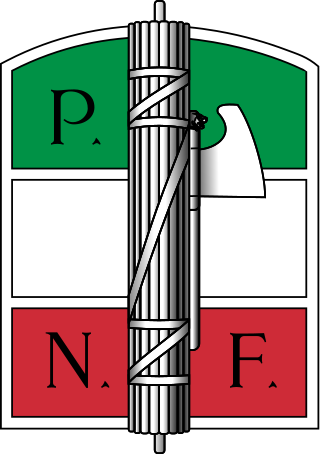
The National Fascist Party was a political party in Italy, created by Benito Mussolini as the political expression of Italian fascism and as a reorganisation of the previous Italian Fasces of Combat. The party ruled the Kingdom of Italy from 1922 when Fascists took power with the March on Rome until the fall of the Fascist regime in 1943, when Mussolini was deposed by the Grand Council of Fascism. It was succeeded, in the territories under the control of the Italian Social Republic, by the Republican Fascist Party, and ultimately dissolved at the end of World War II.

The Falange Española Tradicionalista y de las Juntas de Ofensiva Nacional Sindicalista, frequently shortened to just "FET", was the sole legal party of the Francoist regime in Spain. It was created by General Francisco Franco in 1937 as a merger of the fascist Falange Española de las JONS with the monarchist neo-absolutist and integralist Catholic Traditionalist Communion belonging to the Carlist movement. In addition to the resemblance of names, the party formally retained most of the platform of FE de las JONS and a similar inner structure. In force until April 1977, it was rebranded as the Movimiento Nacional in 1958.

Cordula "Lina" Poletti was an Italian writer, poet, playwright, and feminist. Often described as beautiful and rebellious, she was prone to wear men's clothing and is considered one of the first women in Italy to openly declare her lesbianism.
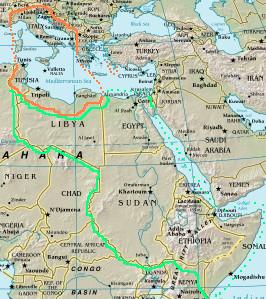
Imperialism, colonialism and irredentism played an important role in the foreign policy of Fascist Italy. Among the regime's goals were the acquisition of territory considered historically Italian in France and Yugoslavia, the expansion of Italy's sphere of influence into the Balkans and the acquisition of more colonies in Africa. The pacification of Libya (1923–32), the invasion of Ethiopia (1935–36), the invasion of Albania (1939), the invasion of France (1940), the invasion of Greece (1940–41) and the invasion of Yugoslavia (1941) were all undertaken in part to add to Italy's national space. According to historian Patrick Bernhard, Fascist Italian imperialism under Benito Mussolini, particularly in Africa, served as a model for the much more famous expansionism of Nazi Germany in Eastern Europe.

Francesco Menzio was an Italian painter.

Ettore Ovazza was an Italian Jewish banker. He was an early financer of Benito Mussolini, of whom he was a personal friend, and Italian fascism, which he supported until the Italian racial laws of 1938. He founded the journal La nostra bandiera. Believing that his position would be restored after the war, Ovazza stayed on after the Germans marched into Italy. Together with his wife and children, shortly after the Fall of Fascism and Mussolini's government during World War II, he was executed near the Swiss border by SS troops in 1943.
Nicholas Doumanis is a historian of Europe and the Mediterranean world. Born in Australia in 1964, he studied at the University of Sydney and the University of New South Wales, where he acquired his PhD.
The following is a timeline of the history of the city of Turin, Piedmont, Italy.
Alberto Piazza was an Italian human geneticist who was Professor of Human Genetics at the University of Turin.
Douglas A. Harper is an American sociologist and photographer. He is the holder of the Rev. Joseph A. Lauritis, C.S.Sp. Endowed Chair in Teaching with Technology at Duquesne University, a chair funded by a grant from the Mellon Foundation.
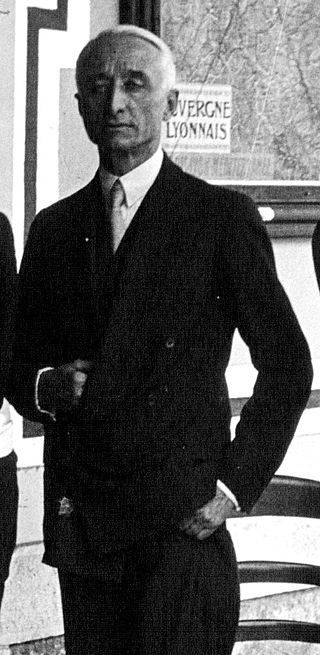
Riccardo Gualino was an Italian business magnate and art collector. He was also a patron and an important film producer. His first business empire was based on lumber from Eastern Europe and included forest concessions, lumber mills, ships and warehouses. The highly leveraged structure collapsed in 1912–13. Gualino was also involved in manufacturing and distributing cement, and during World War I (1914–18) built and operated cargo ships carrying goods such as coal from the United States to Europe. After the war he was engaged in many enterprises, some in partnership with Giovanni Agnelli of FIAT. His activities included banking, manufacture of rayon, confectionery, chemicals and artificial leather.

Alastair Andrew Hamish Hamilton FBA is an English historian.
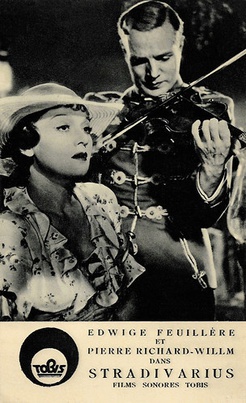
Stradivarius is a 1935 drama film directed by Albert Valentin and Géza von Bolváry and starring Pierre Richard-Willm, Edwige Feuillère, and Robert Arnoux. It was made by Tobis Film as the French-language version of the film Stradivari.
Paolo Spriano was an Italian historian of the Italian labor and communist movement.
References
- ↑ "Passerini, Luisa 1941-" . Retrieved 7 June 2021.
- 1 2 3 Martha King (1997). "Passerini, Luisa (1941–)". In Rinaldina Russell (ed.). The Feminist Encyclopedia of Italian Literature. Greenwood Press. pp. 245–6.
- ↑ Luisa Passerini (October 2011). "A Passion for Memory". History Workshop Journal . 72 (1): 241–250.
- ↑ Richard Cándida Smith (Fall 1998). "Popular Memory and Oral Narratives: Luisa Passerini's Reading of Oral History Interviews". Oral History Review. 16 (2): 95–107.